Review
of Taurus
627
627SS Tracker and Accessories
Revision 1.2
I had a chance to use a Taurus
model 627SS Tracker chambered for .357 / .38 Special with a 4" barrel. Some have said the .357
Magnum / .38 Special is the best overall revolver to own. I also used speedloaders from HKS 587A and 5-star
Firearms 7L-357/38, and Tuff
8357 Quickstrips. I also was provided a Wilderness
Speedloader Carrier. Lastly, I used a 4" revolver holster
by Federal. This page reports my observations.
A sister page documents how to clean lead out of a barrel
after shooting 300 rounds of lead round-nose bullets. Unlike most
autoloaders, revolvers will work even when they are very dirty.
That said, a Sig P239 shot over 600 rounds without a cleaning and never
glitched once.
Looking at the bottom of the speed loader,
you can
see the shaft and roll pin that flips flops to either side of a ball
bearing under spring pressure. The rotating center shaft is in
the CW position as shown in the picture. When in the CCW position
(as viewed from the top), little star corners stick out into the
cylinder holes to hold the casings.
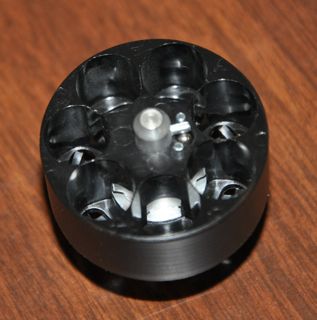
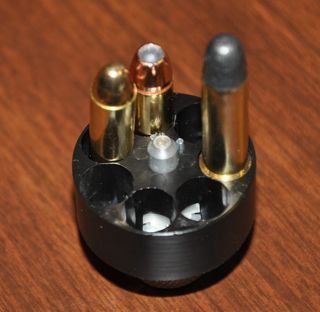
Interesting, all of the cartridges did not fit! The Armscor FMJ
.357
dropped in fine. The Hornady XTP .38 Special dropped in
fine. The
Magtech LRN .38 Special did not fit. I could push it in, but it
absolutely would not drop out. As shown in the picture, two
cartridges are dropped in the holes, while the LRN catridge is balanced
on the hole, and won't drop in. You can't use this speed loader
with this cartridge.
I got out my calipers and micrometer and
checked a few things. Cartridge body spec'd diameter is
0.379". Spec size for the rim is
0.440". Diameters in increasing rim size order are:
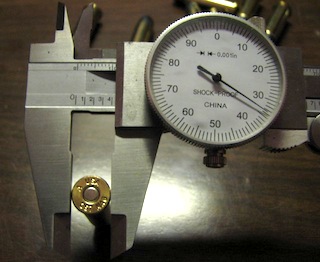
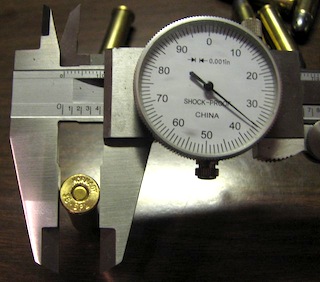
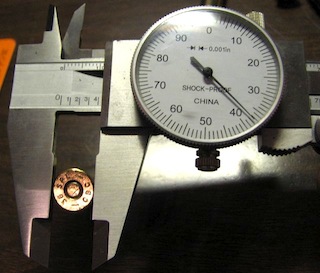
All the cartridges are smaller than spec,
so they all should have fit into the larger speedloader hole. I
was intrigued why the Magtech .38 Special LRN catridge would not fit into the
bigger hole. It turns out the "round" holes of the speedloader
are not quite round. The holes are a little bit
"dog house" shaped, which gave a loose fit only to cartridges
significantly smaller than hole size. I think this is a character
of the HKS 7-cartridge reloaders; the walls between the holes are just
so thin, the black plastic slightly deforms.
I received model L7-357/38. These
run about 2-3x the cost of the HKS speedloaders. The 5-star
loaders
are milled from solid Aluminum blocks. Notice the backside of the
speedloader is solid, and there are no walls of metal
between the cartridges like the HKS speedloader. The lack of
walls between cartridge slots makes this speedloader workable with all
cartridge types I have.
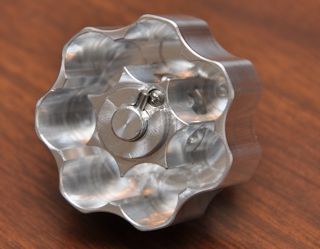
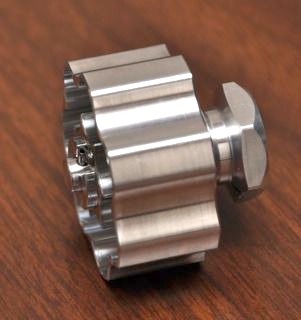
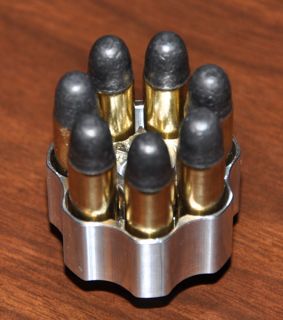
So far, I don't like the "hexbolt" knob on the back side of the
5-star, believing the knurled knob surface of the HKS gives a better
grip. With the aluminum construction, 5-Star
is able to paint or anodize loaders in various colors. They even
offer one anodized in light green with red accent paint for their
"zombie apocolypse speed loader". It seems they're just starting
to experiment with the colored concept and have not matured the product
line. Different anodized colors would be perfect for different
calibers or bullet types. For instance, maybe round nose
in blue loaders, and hollow point in red loaders. Or for the
caliber I'm working with, it would be great to have two colors - one
loaded with .38 Special and one loaded with .357 Mag. My wife
would grab one color, I'd grab the other. For all the
success Apple found doing this with MP3 players, I think 5-Star has
room to expand their line.
The HKS loader has metal retention pins or star that press the
bullets
back against the outer side of the cartridge holes. The 5-star loader
has a similar design except the metal retention star does not apply any
radial pressure to the cartridge. It just swings into place and
prevents the rim from falling out. The result is that the HKS is
quieter and less "wiggly". The 5-star makes more rattly noise when
wiggled, but lets the cartridges fall out freer when released. When
secured in the loader carrier, the 5-star loader definitely rattles
with each step. The HKS loader is silent. The
5-star speedloader also easily handles the Magtech .38 special LRN
cartridges that were too snug of a fit in the HKS loader.
Lastly, something I did not expect, the HKS releases the cartridges
when the back knob is rotated clockwise. The 5-star loader
releases cartridges when the back knob is rotated counter-clockwise.
Uggh.. that bothered me a bit. When situations get moving
quickly, I want to have muscle habits down always doing things the same
way. For know, in the dark, if I feel knurling, I rotate
CW. If I feel a hex knob, I rotate CCW. Not ideal.
The best. It's sewn together in sort of a cross shape. Side
straps come around the speedloader from either side and secure down
with hook-n-pile fasters. Any diameter speedloader would fit. The
top drops over the loader and is secured on the front. A good
design I didn't expect is the secondary strap that goes down the back
inside of the carrier and hooks across the bottom. This is a good
way of securing the entire assembly onto your belt without a hook and
without threading your belt through a sewn loop. When I took the
picture shown here, I tried to disconnect and set the belt strap a
little bit crooked so you can see it in the picture.

I usually keep one or two of these on my belt-line and any other
reloaders in a pocket or pouch the way an auto user would put some
magazines on the belt and some in pockets. I use the speed
loaders in my pockets first and retain the belt-mounted ones for last
or for when the fastest swap time is required.
These
proved to be WAY more useful than I imagined. The cylindrical speed
loaders are good only for initial loads or "emergency" reloads when
you've depleted the cylinder and need to respond quickly (animal or
human aggressor is still coming, possibly shooting at you). Get
under cover and reload quickly by dumping all empties and put in 7 new
bullets.
When running through some house clearing exercises, I ealized when there's a pause or the engagement is on my
timeline, typically only part of the bullets were shot and there was no
way I wanted to dump good bullets. Instead I opened the cylinder
and flicked out 2-4 bullets - which are always from the same locations
in the cylinder of course, so this can be done even in the dark.
Then I pulled the quick strip from a rear pocket, reaching over the top
of the gun. I could put 2 bullets at a time as fast as the auto
guys could rotate a topped-off clip into their handgun. In
practice drills using 2-4 bullets, I could top off and be back in my
holster faster than the auto magazine swappers. Massad Ayoob demo.
In other words, emergency reloads => use the cylindrical
reloaders, tactical reloads => use the quick strips. See
also Quickstrip Loading Drills.
The gun alone weighs in at 37 oz. Taurus' web page
says it weight 28.8 oz, which is not true for the stainless steel
model. I think the published weight is for a titanium
version. Trigger pull DA is 12
lbs, and the trigger pull SA is 5 lb. DA trigger travel is 1.4
cm. Firing the gun with the hammer cocked back is very smooth and
requires less than 1 mm of trigger movement.

Using only the FMJ .357 cartridges, I
practiced loading cartridges using an
HKS 587A speed loader. Drop the cartridges into the holes, and
rotate the metal knob counterclockwise. Rotating the knob
clockwise drops them all out. I spent one night doing this over and
over again, practicing until I could do it quickly in the dark.
Click on the photo to watch the Quicktime
video.
 After about 50-100 practice load cycles, I pushed
the cylinder closed, and it wouldn't close. It pretty much locked
up! No gun should do this. Especially a "reliable"
revolver. Especially a brand-new 4-day old revolver that had
never been used. I forced the cylinder open, and removed the
cartridges. The mechanisms remained stuck, and the gun became
non-operational. In a real-life live-or-die situation, I could not have
fired a cartridge in any way! Ouch!! Click on the photo
to watch the Quicktime video.
After about 50-100 practice load cycles, I pushed
the cylinder closed, and it wouldn't close. It pretty much locked
up! No gun should do this. Especially a "reliable"
revolver. Especially a brand-new 4-day old revolver that had
never been used. I forced the cylinder open, and removed the
cartridges. The mechanisms remained stuck, and the gun became
non-operational. In a real-life live-or-die situation, I could not have
fired a cartridge in any way! Ouch!! Click on the photo
to watch the Quicktime video.
What you see in this video: Release
seems to be properly forward. Cylinder close is tight.
Hammer won't cock back. Trigger won't pull. Cylinder
release did not click back (still sprung forward). Forcing cylinder
open and closed again fixed the release. Hammer is still unable
to pull back. Trigger still won't fire the gun.

Fiddling with the trigger, cylinder
release, hammer, and cylinder got it to lock up in various modes.
In this case, the triger stuck back. Click on the photo to watch the
Quicktime video.
What you see in this video: Notice trigger
is stuck back to start with, with nobody touching the gun.
Cylinder release will not operate. Cylinder will not rotate. Trigger
does nothing (it's already stuck back). Hammer does cock and seems to
release, but then hammer won't come back again, and trigger won't work.
Can you imagine this happening when the bad guy is
approaching? Double thumb jamming the cylinder release causes it
to work. Hammer and trigger still non-operational.
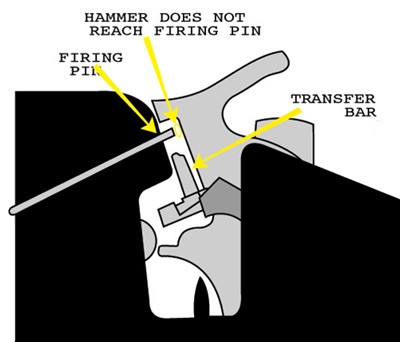 Also, amidst all of this, I noticed the transfer bar,
which is suppose to block the firing pin from the hammer, can be
depressed (along with the firing pin) no matter what position the
trigger is in. Taurus
product specification
says, "The transfer bar mechanism prevents the hammer from striking the
firing pin unless the trigger is pulled fully to the rear." I'll have
to investigate this more.
Also, amidst all of this, I noticed the transfer bar,
which is suppose to block the firing pin from the hammer, can be
depressed (along with the firing pin) no matter what position the
trigger is in. Taurus
product specification
says, "The transfer bar mechanism prevents the hammer from striking the
firing pin unless the trigger is pulled fully to the rear." I'll have
to investigate this more.
Taurus does offer a lifetime
warranty. Handguns have to be sent FedEx or
UPS overnight by air. That's a $100.49 bill one-way. With a
brand new gun, Taurus may cover the cost both ways. I agree with Chuck Hawks
#1 rule for a home defense weapon: 100% reliability,
so I'm concerned about the viability of the gun for this purpose. I
will start gaining back confidence after putting several hundred rounds
through
it, with a burst of no less than 100, to see how it behaves with a hot
barrel. Guns
are survival tools, and must be meet high standards of
trustworthiness.
The holster is just the right size for the 4" Taurus
Tracker. It's
made with a tough grade of synthetic fabric, and has padding sewn into
the fabric. It provides for an easy firm handle grip, thumb button
release, and quick draw. Like any thumb release holster, putting the
revolver back is probably a two-handed effort to secure the button. The
belt clip is easy on/off, but is a bit more loose that threading your
belt through the sewn on loop. The thumb release strap is
hook-n-pile
secured on both ends, so it is adjustable back and forth to where you
like it.
Stitching around the edge of the holster seems to be a 2-pass
affair.
The second pass has really loose stitching. Look at the picture
below near the bottom round part. It's almost as if the
sewer ran out of thread while making this holster and started the next
spool by double stitching for a few inches. I'll update text here
after the holster wears for a while.
I couldn't find the manufacturer website, so the link above is to the
Amazon store. The holster arrived in a plastic bag with what
looked
like a UPC label "X0002BKODL" with the words '4" Revolver Holster
S&W 27, 29, 629, 686, Ruger Redhawk'. However, the ASIN and
Model
number on the Amazon page don't match.
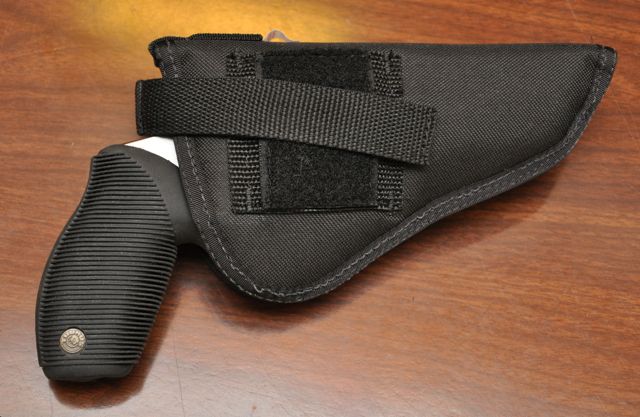
Loaded with .38 Special LRN bullets, the gun and holster weigh in at
43 oz. Notice this conflicts with the 28.8 oz empty weight claimed for
the model 627 on on Tarus' website. The weight is enough to pull the
belt down a bit, but when I get working,
I forget it's there. Size is fine for working around the garage
or
sitting at a desk. With a pair of jeans, I wear it behind the
side
belt loop of the pants, putting it a bit aft of a direct
side-carry. For a weight comparison, my classic (old) Leatherman
Super
Tool with carrying pouch weighs in at 10 oz. Although the weight of the
handgun package is 4x, the size and shape makes it feel maybe twice as
"pull down-y" as the leatherman.












 After about 50-100 practice load cycles, I pushed
the cylinder closed, and it wouldn't close. It pretty much locked
up! No gun should do this. Especially a "reliable"
revolver. Especially a brand-new 4-day old revolver that had
never been used. I forced the cylinder open, and removed the
cartridges. The mechanisms remained stuck, and the gun became
non-operational. In a real-life live-or-die situation, I could not have
fired a cartridge in any way! Ouch!! Click on the photo
to watch the Quicktime video.
After about 50-100 practice load cycles, I pushed
the cylinder closed, and it wouldn't close. It pretty much locked
up! No gun should do this. Especially a "reliable"
revolver. Especially a brand-new 4-day old revolver that had
never been used. I forced the cylinder open, and removed the
cartridges. The mechanisms remained stuck, and the gun became
non-operational. In a real-life live-or-die situation, I could not have
fired a cartridge in any way! Ouch!! Click on the photo
to watch the Quicktime video. Also, amidst all of this, I noticed the transfer bar,
which is suppose to block the firing pin from the hammer, can be
depressed (along with the firing pin) no matter what position the
trigger is in. Taurus
product specification
says, "The transfer bar mechanism prevents the hammer from striking the
firing pin unless the trigger is pulled fully to the rear." I'll have
to investigate this more.
Also, amidst all of this, I noticed the transfer bar,
which is suppose to block the firing pin from the hammer, can be
depressed (along with the firing pin) no matter what position the
trigger is in. Taurus
product specification
says, "The transfer bar mechanism prevents the hammer from striking the
firing pin unless the trigger is pulled fully to the rear." I'll have
to investigate this more.